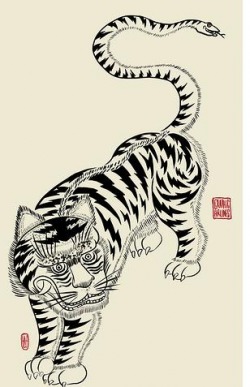This Chinese metaphor 虎头蛇尾 (hŭ tóu shé wĕi) literally means "tiger head, snake tail". In Chinese tradition, tiger symbolizes, among other things, invincibility, might, power and snake sneakiness. Another explanation is that a tiger head is big and a snake tail is small and skinny. 虎头蛇尾 refers to events which start out big and end up small. Its has similar meaning to the English expressions:
Por la traducción al español de este proverbio, nos dice que es algo que empieza con un estallido, y termina en un leve sonido, o algo que al parecer empieza con mucha fuerza y termina mal, por eso lo de "Cabeza de tigre y cola de serpiente". Por tanto, podríamos relacionarlo con varios del refranero español, como por ejemplo:.
Examples
- Starts with a bangs ends with a whimper 虎头蛇尾
- Much ado about nothing 雷声大雨点小
Por la traducción al español de este proverbio, nos dice que es algo que empieza con un estallido, y termina en un leve sonido, o algo que al parecer empieza con mucha fuerza y termina mal, por eso lo de "Cabeza de tigre y cola de serpiente". Por tanto, podríamos relacionarlo con varios del refranero español, como por ejemplo:.
- Partida de caballo inglés y llegada de burro 虎头蛇尾
- Mucho ruido, y pocas nueces 雷声大雨点小
Examples
- The Copenhagen Climate Change Summit started with a bang and ended with a whimper or it was much ado about nothing.
- La Conferencia Cumbre de Cambio Climático en Copenhague finalizó con mucho ruido y poca nueces.
- 哥本哈根气候峰会虎头蛇尾 ,雷声大雨点小。
- The Houston Rockets started the 2009 season with a bang, but ened with a whimper at they won the first 20 games but could not make into the playoff. (not true)
- Los Rockets de Houston comenzó la temporada 2009 con un golpe al ganar los 20 primeros partidos, pero no pudo hacerlo en el desempate. Fue "partida de caballo inglés y llegada de burro. (no es cierto).
- 休斯顿火箭队2009季初连赢二十场但是进不到季后賽,真是虎头蛇尾。(不确)


 RSS Feed
RSS Feed